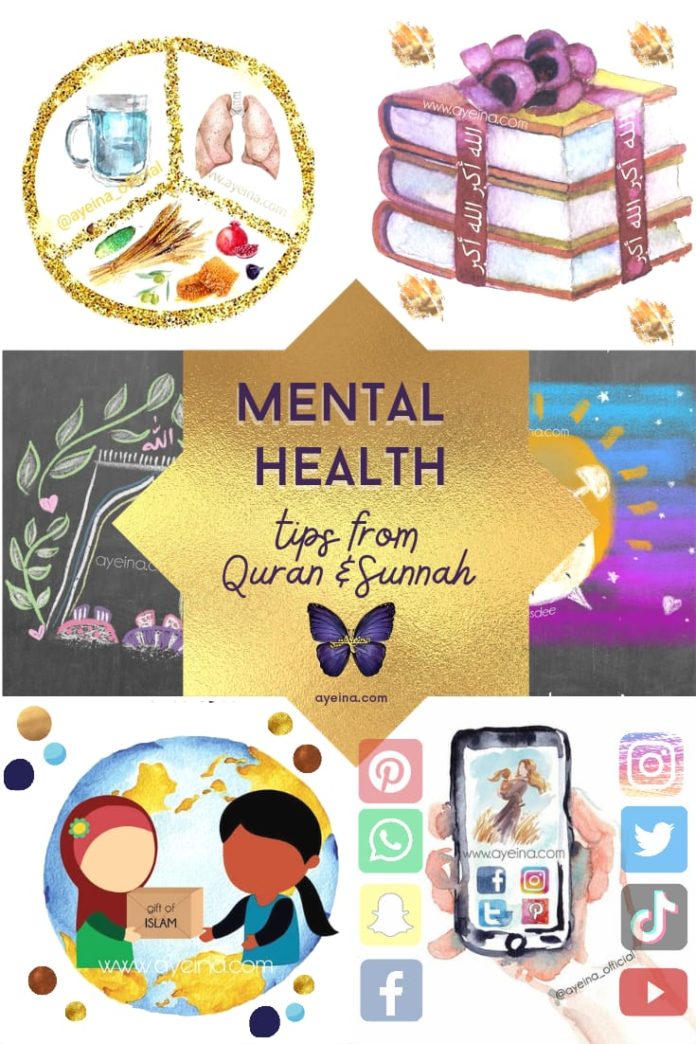by Myrah and Team AYEINA
Mental health is our emotional, psychological, and social well-being. Mental health does not only affect the way we think, feel, and act but also how we handle stress, relate to others, and make choices.
Islam is an Abrahamic religion that covers every aspect of life, from worship to trading to eating and more. Most of us lead busy lives and tend to forget the many gems that Allah has mentioned in the Holy Quran, and the Prophet Muhammad (PBUH) has shown us through his Sunnah. Islam offers a spiritual sanctuary for Muslims to live a peaceful life by using their inner strengths and having a strong relationship with the ultimate power, Allah, being optimistic, purifying their feelings, and not waiting for outside events to improve. Islam acknowledges the importance of spiritual status as an interior power that can be exercised to have a calm mind, healthy consciousness, and positive thoughts.
Good health and leisure are the two gifts of Allah. It is crucial for us to be mindful of them and to strive towards ensuring that we make the most of them. Mental health issues cannot be ignored. A healthier mind can achieve more.
If you or someone you know is struggling to maintain their mental health, I hope that the following mental health tips from the Quran and Sunnah help as a starter along with the professional help that any individual may need:
1. Acknowledge mental health and understand that with hardship comes ease
The Prophet ﷺ acknowledged and addressed psychological challenges for the Muslim Ummah to learn from. The prophets experienced grief, sorrow, and anxiety in their lifetimes. Prophet ﷺ himself experienced grief so intense after the passing of his beloved wife Khadijah (رضي الله عنها) and his uncle, Abu Talib, paired with the social and economic boycott of Muslims in Makkah, that the entire year was called “The Year of Sorrow” (aam-ul-huzn).
Prophet Yaqub (السلام عليه) suffered a prolonged period of grief as mentioned in the Quran:
“And he turned away from them and said: “Alas, my grief for Yusuf (Joseph)!” And he lost his sight because of the sorrow that he was suppressing.” [Quran; 12:84]
The Prophet ﷺ experienced a decline in his health as he was affected by concern for those who opposed Islam in Makkah and so, Allah revealed the ayah:
“Perhaps, you, would kill yourself (O Muhammad ﷺ ) in grief, over their footsteps (for their turning away from you), because they believe not in this narration (the Quran).” [Quran; 18:6]
The Quran and Sunnah provide endless wisdom to men of understanding. No matter your religion or sect, there is a lot that you can learn. If you feel hopeless and anxiety takes over you, remember that Allah promises ease after hardship. Allah has mentioned:
“For indeed, with hardship ease. Indeed, with hardship ease.” [Quran; 94:5-6]
2. Take Care of Your Physical Health and eat in moderation
Another great tip that we can derive from the Quran is to eat not only Halal but tayyib food.
“Then eat of what Allah has provided for you lawful and good and be grateful for the favor of Allah if it is Him that you worship.” [Quran; 16:114]
Islam insists on taking care of our physical health. Dietary changes can lead to positive improvements in mood regulation.
The truth is that mental health and physical health are intertwined. Take time to exercise, establish a good sleep routine, and eat healthy food. Thus, you will get to improve your physical health, which would also make you feel less stressed or anxious.
The food you eat affects how your brain works. Even subtle deficiencies can make you sad, anxious, or tired. The following considerations will prove useful.
- Eat food that is rich in folic acids, such as legumes and green leafy vegetables. It will make you less irritable and depressed. Besides, it also helps improve your sleep.
- Stock up on nuts and fruits as they improve mental alertness.
- Carbs are known for their ability to boost serotonin in the brain. Hence, you should eat carbs to lift your mood if you have the winter blues or just feel depressed for no reason.
- Make sure to eat protein-rich, low-fat foods like fish (see: Is octopus halal?) as such foods energize your brain, whereas sugary foods should be avoided as they dull your mental processes.
Allah instructs us
“O children of Adam, take your adornment at every mosque, and eat and drink, but be not excessive. Indeed, He likes not those who commit excess.” [Quran; 7:31]
Eat the right amount of Sunnah foods like lentils, dates, and honey as they are known for their physical and mental health benefits. Balance is crucial as an excess of any type of food harms our overall health hence affecting our mental abilities too.
Sunnah of Muhammad ﷺ also teaches us moderation and balance – 1/3 food, 1/3 water, and 1/3 air (space left for breathing). A dehydrated body creates a dehydrated brain which leads to everyday challenges around mood, concentration, and feelings of peace and contentment. Staying hydrated is essential to being able to develop healthy emotional regulation skills. Good mental health requires a healthy brain, and without water, that healthy brain is not possible.
3. Seek help through patience and prayer
As Allah has mentioned,
“Those who have believed and whose hearts are assured by the remembrance of Allah, unquestionably, by the remembrance of Allah, hearts are assured.” [Quran; 13:28]
It is clear just how important it is to remember God through prayer and dhikr. Establish daily prayers by learning about the prayer times. You can even use an app to monitor the time for each prayer and set alerts to pray on time.
Grief, hurt, fear, sadness, worry, discontentment, anger, indecision, stress, jealousy, and anxiety stand no chance in front of The Almighty. So make dua with that conviction. And do your best as well.
Prayer assists in keeping Muslims on a daily clock, but on top of the five required prayers are additional positive routines that can be set. Islam teaches us that every muscle and part of our body has memory, including the brain, and so when we are able to establish healthy routines for our physical, mental and spiritual health, we are able to increase our muscle memory in a positive manner. When depressed, it can be very difficult to find the willpower to even get out of bed, let alone tackle the entire day. Yet, when we’ve created solid routines for ourselves, it may still feel difficult to get up and get going, it will be much easier to get up when your body has been practicing your daily life routine every other day.
4. Be mindful of your media/social media consumption
mindfulness is a mental state achieved by focusing one’s awareness on the present moment, while calmly acknowledging and accepting one’s feelings, thoughts, and bodily sensations, used as a therapeutic technique. CBT (cognitive behavioural therapy) aims to teach people to help themselves by understanding their current ways of thinking and behaving, and by equipping them with the tools to change their behavioural patterns – to challenge negative thinking to bring serenity.
With practice, a lot of things become easy and a simple part of life. Especially in the age of social media, where we are able to compare our lives to others day in and day out, it’s easy to forget that each of us has our own journey, and each of us has been blessed in one way or the other. Technology is just a tool, but it can bring the best and the worst in us.
Ibn ‘Umar said: “The Messenger of Allah ﷺ grabbed me and said: ‘Be in the world like a stranger or a passerby, and count yourself among the inhabitants of the grave.'” Ibn ‘Umar said: “When you wake up in the morning, then do not concern yourself with the evening. And when you reach the evening, then do not concern yourself with the morning. Take from your health before your illness, and from your life before your death, for indeed O slave of Allah! You do not know what your description shall be tomorrow.” [Hadith; Jami` at-Tirmidhi 2333]
Seeing other people live a perfect life online can lead to false expectations sometimes. Remember that everyone has moments of joy and grief in life. Nobody has a perfect life, but most of online life is a collection of people’s happy moments. Try to declutter your devices and ask yourself: are all these accounts that I follow on social media bringing anything positive to my life? Are all of these news applications and websites giving me beneficial knowledge of our world? Am I spending my time in a way that will help me not only in this life but also in the next? How much time am I spending on my devices versus with my family and friends?
5. Live in the Present and keep your focus in the Hereafter
Many of us think endlessly about lifelong regrets and let anxieties of the future hold us back. By focusing on living in the present, one may notice an improvement in their mental health.
Never dwell on the what-ifs. There is much wisdom in the following hadith, which mentions to not worry about what has befallen you and what has not come to pass.
Be mindful of Allah, and you will find Him in front of you. Recognize and acknowledge Allah in times of ease and prosperity, and He will remember you in times of adversity. And know that what has passed you by was not going to befall you, and what has befallen you was not going to pass you by. And know that victory comes with patience, relief with affliction, and hardship with ease. [Hadith Nawawi 19]
6. Help Others to Help Yourself
Being kind, helpful, and generous towards others increases our own happiness. Helping others brings a contentment that is unrivaled, which leads to mental serenity. Those who help others are scientifically proven to have lower blood pressure and a higher life expectancy.
Therefore, practice acts of kindness; help those in your surroundings for mental peace and contentment. Indeed, it is due on a Muslim to practice charity every day, as the hadith says:
“Every joint of a person must perform a charity each day that the sun rises.” – [Hadith Nawawi 26]
Conclusion
“…Allah does not burden a soul beyond what it can bear…” [Quran; 2:286]
As mentioned here: “The Qur’an describes the nafs, or self, as operating out of one of three states: nafs al-ammara (commanding self); nafs al-lawwama – accusatory self; and nafs al-mutmainna (peaceful self). The Qur’an explains how these states command our psyche and tell us what to do, they control us and dominate us. If we have nafs al-ammara, it means we are subjugated by the self, we listen and follow its commands. This stage describes the part of us that requires material possessions and sensual desires. With nafs al-lawwama we are conscious of our own imperfections and, inspired by our hearts, we see the results of our actions and our weaknesses and aspire for perfection. Finally, nafs al-mutmainna implies contentment and peace, there are no immoral desires. This is the ideal state of ego, there is tranquillity and peace.
When our emotional needs are being poorly met, the nafs al-ammara begins to control our feelings, thoughts, and behaviours. The Qur’an provides guidance to learn and practice relaxation exercises to weaken the influence of the nafs al-ammara. When it is in control, our thoughts are distorted leading us to take things personally, to see everything in a negative light, and believe that things can’t be changed for the better.
When our conscience, the nafs al-lawwama is active, we become aware that something is wrong with the way we are feeling and behaving. We can then learn to challenge negative thinking leading us to our nafs al-mutmainna. The Qur’an uses a technique called Alif-Lam-Mim for strengthening the nafs al-lawwama and help bring about a more peaceful state of being. Mindfulness is a modern concept, which emphasizes a mental state of awareness, focus, and happiness. Mindfulness is a way in which we can become more aware of ourselves, our thoughts and our feelings, and act in a way which is mindful of ourselves and others despite our nafs and desires.”
May each of these tips help you lead a healthier and happier life. Bookmark this page because of verse 51:55 “And remind, for indeed, the reminder benefits the believers.”
BIO: Myrah Abrar is a computer science graduate with a passion for web development and digital marketing. She writes blog articles for Muslims & Quran.






